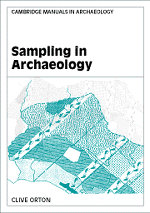Book contents
- Frontmatter
- Contents
- List of illustrations
- List of tables
- Acknowledgements
- 1 All the world's a sample
- 2 A little of what you fancy?
- 3 If this is the sample, what was the population?
- 4 Covering the ground
- 5 What's in a site?
- 6 The answer lies in the soil
- 7 ‘But many sanguine people hope, to see them through a microscope’
- 8 ‘In its depths, what treasures’
- 9 Beyond random sampling
- Appendix
- Bibliography
- Index
9 - Beyond random sampling
Published online by Cambridge University Press: 05 June 2012
- Frontmatter
- Contents
- List of illustrations
- List of tables
- Acknowledgements
- 1 All the world's a sample
- 2 A little of what you fancy?
- 3 If this is the sample, what was the population?
- 4 Covering the ground
- 5 What's in a site?
- 6 The answer lies in the soil
- 7 ‘But many sanguine people hope, to see them through a microscope’
- 8 ‘In its depths, what treasures’
- 9 Beyond random sampling
- Appendix
- Bibliography
- Index
Summary
Introduction
Well, you have made it. Here we are at the final chapter, ready to review what we have learnt from this survey of the role of sampling in archaeological theory and practice, and to see how it might be applied in the future, both in the discipline as a whole and in individual professional careers. I hope that you have read at least some of the chapters that are outside your own immediate practical concerns, and are beginning to see how a knowledge of work undertaken at other scales can broaden your vision and expand your ideas. At the same time, it should be recognised that the scales defined here are arbitrary, devised for the purposes of structuring this book. In reality, of course, there is a continuum, and work at no one scale should be considered in isolation from the others. In this chapter I shall try to highlight what I consider to be the main opportunities provided for archaeologists both by recent (and some not-sorecent) developments in statistical sampling theory and by rapid developments in electronic technology, as well as some of the problems in archaeological practice that remain to be overcome.
First, though, I must pause to re-emphasise the centrality of sampling to both archaeological theory and practice. We saw in chapter 3 how sampling theory can make a useful contribution to debates about archaeological inference in the face of distorting factors imposed by site formation processes.
- Type
- Chapter
- Information
- Sampling in Archaeology , pp. 206 - 209Publisher: Cambridge University PressPrint publication year: 2000



